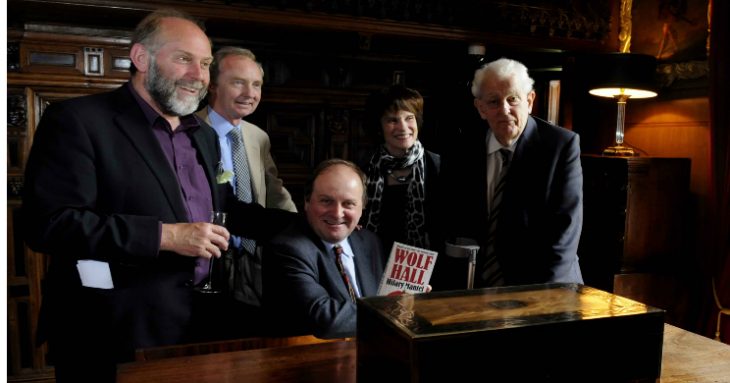The history of the Prize
“The genre that Sir Walter established has had mixed fortunes, even in my reading lifetime. It has been deeply unrespectable. But a genre doesn’t need respectability so much as it needs vitality. This is what this prize will ensure. It will push writers on to explore the limits of technique and the limits of their influence, and will open up for readers, I hope, the treasures of the genre. Much the best thing that has happened for lovers of historical fiction is the founding of this prize. When I first heard of it I couldn’t quite believe it; it is such a startlingly generous and imaginative gesture, an appropriately old-fashioned act of patronage of the arts.”
Dame Hilary Mantel in 2010
The Walter Scott Prize for Historical Fiction was founded in 2009 by the Duke and Duchess of Buccleuch and the director of the Borders Book Festival, Alistair Moffat. Honouring the achievements of Sir Walter Scott, the founding father of the historical novel and distant kinsman of the Buccleuch family, the Prize is unique for rewarding writing of exceptional quality which is set in the past. It is traditionally awarded annually at the Borders Book Festival in Melrose, Scotland. The winner receives £25,000 and shortlisted authors each receive £1,500, setting it amongst the richest literary prizes in the UK.
On the founding of the Prize, Richard, the 10th Duke of Buccleuch, said:
“The publication of Walter Scott’s Waverley in 1814 marks, by common consent, the birth of the historical novel – and yet today the life and writings of this extraordinary man, one of the most influential Scotsmen ever to have lived, lie shrouded and ignored. This is lamentable, or so it certainly appeared to someone proud to call himself Scott’s family kinsman.
”It struck me and my wife in 2008 that the campaign begun in that year to restore Abbotsford, his historic Scottish Baronial home, needed to reach beyond bricks and mortar and to seek recognition of Sir Walter’s literary and other gifts. Through the medium of a substantial prize for outstanding writing, which vividly records and brings to life the past, as he did – awarded in his name annually at the Borders Book Festival in Melrose, and thanks to Alistair Moffat and a panel of distinguished, independent judges, this is now happening. Almost uniquely, the Prize is awarded not at a formal dinner but in a joyful public celebration of words and books. Its heart is in Scotland – as was Sir Walter’s – but its reach, appropriately for the first international bestselling author, now extends around the globe.”
In 2012, the Prize changed its rules to include novels published in the Commonwealth as well as the UK and Ireland. In 2015 the Prize launched a junior version, The Young Walter Scott Prize, which is the UK’s only historical creative writing prize for young people, and which awards two young winners with a travel grant and a trip to the Borders Book Festival every year. In 2019, the Prize celebrated its tenth birthday, with a Poll to find ‘the nation’s favourite historical novel’ and a specially-commissioned operetta, written by Alexander McCall Smith and premiered at the Prize ceremony in Melrose
The Prize is now managed by The Abbotsford Trust, the independent Scottish Charity responsible for Sir Walter Scott’s extraordinary Borders home, and is supported by Hawthornden Foundation and the Buccleuch Living Heritage Trust.
Timeline of the Walter Scott Prize
2009 Prize founded by Duke and Duchess of Buccleuch and Alistair Moffat
2010 Inaugural prize awarded to Wolf Hall by Hilary Mantel at Abbotsford, Scott’s home in the Borders
2011 Second Walter Scott Prize awarded to The Long Song by Andrea Levy at Borders Book Festival, Melrose
2012 Commonwealth rule introduced. Third prize won by On Canaan’s Side by Sebastian Barry
2013 Fourth prize won by The Garden of Evening Mists by Tan Twan Eng
2014 Fifth Walter Scott Prize won by An Officer and a Spy by Robert Harris
2015 Young Walter Scott Prize launches
Sixth Walter Scott Prize won by The Ten Thousand Things by John Spurling
2016 Seventh Walter Scott Prize won by Tightrope by Simon Mawer
First Young Walter Scott Prize winners announced at Borders Book festival
2017 Eighth Walter Scott Prize won by Days Without End by Sebastian Barry
2018 Ninth Walter Scott Prize won by The Gallows Pole by Benjamin Myers
Winner congratulated in a special Royal Mail postmark on over 500 million pieces of mail
2019 Tenth Walter Scott Prize won by The Long Take by Robin Robertson
Prize celebrates 10th anniversary with commissioned operetta, and Wolf Hall wins poll to find the nation’s favourite historical novel
2020 Eleventh Walter Scott Prize won by The Narrow Land by Christine Dwyer Hickey
2021 Twelfth Walter Scott Prize won by The Mirror and the Light by Hilary Mantel
2022 Thirteenth Walter Scott Prize won by News of the Dead by James Robertson
2023 Fourteenth Walter Scott Prize won by These Days by Lucy Caldwell
2024 Prize comes under the management of The Abbotsford Trust, with the support of Hawthornden Foundation and the Buccleuch Living Heritage Trust
Fifteenth Prize won by Hungry Ghosts by Kevin Jared Hosein

